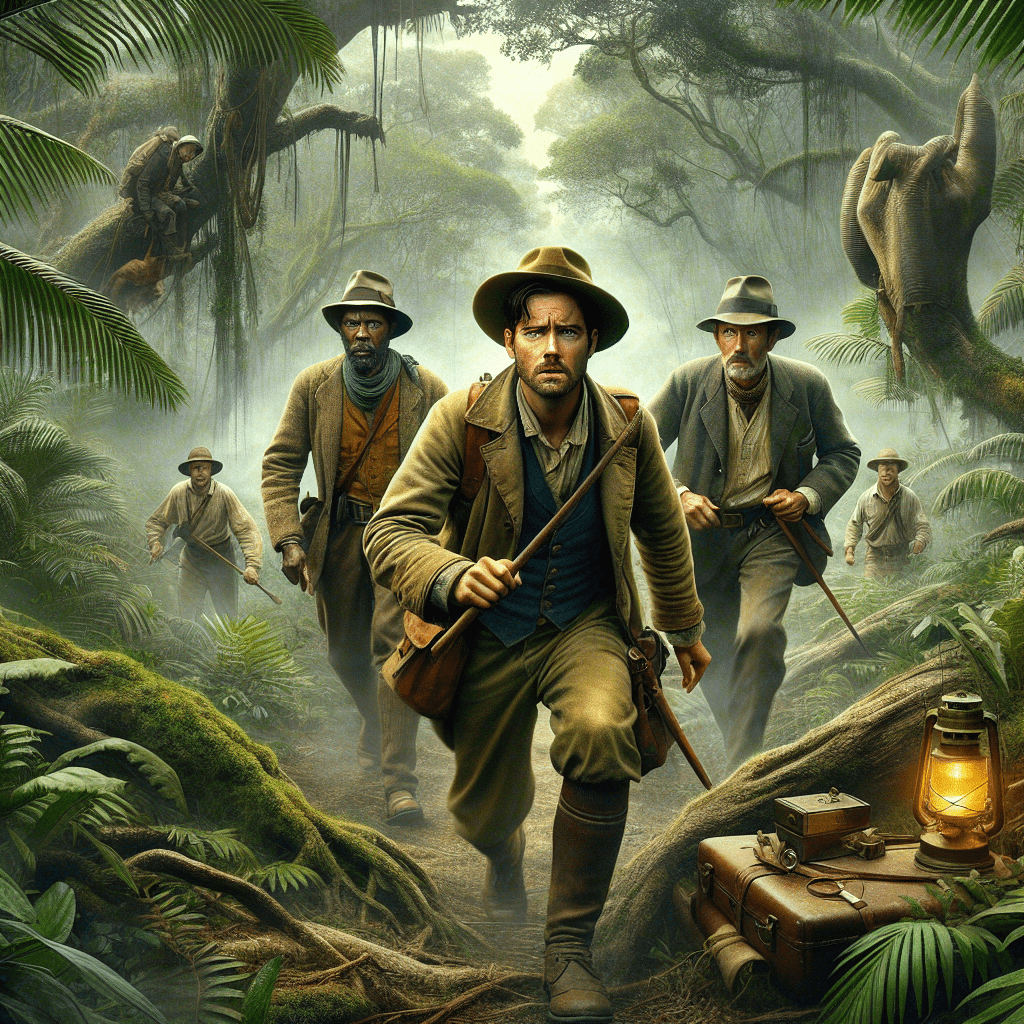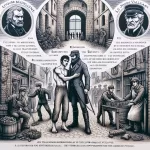-
Inhoudsopgave
“Unraveling the high-stakes drama of survival and betrayal in David Grann’s ‘The Wager’.”
“The Wager” by David Grann is a gripping historical narrative that recounts the harrowing tale of a shipwreck and the subsequent survival struggle of its crew in the 18th century. The book delves into themes of leadership, morality, and the human spirit’s resilience in the face of adversity. Grann intricately weaves together the personal stories of the characters, highlighting their diverse backgrounds and motivations, while exploring the broader implications of their ordeal. Through meticulous research and vivid storytelling, “The Wager” offers a profound examination of the complexities of survival, loyalty, and the quest for truth amidst chaos.
Summary of The Wager by David Grann
In “The Wager,” David Grann presents a gripping narrative that intertwines adventure, survival, and the complexities of human nature against the backdrop of the 18th-century maritime world. The story revolves around the ill-fated voyage of the British warship HMS Wager, which set sail in 1740 as part of a larger expedition led by Commodore George Anson. The narrative begins with the ship’s ambitious mission to capture Spanish treasure ships, a venture that promises wealth and glory. However, the journey quickly descends into chaos when the Wager encounters treacherous weather and navigational challenges, leading to its eventual shipwreck on a desolate island off the coast of Patagonia.
As the crew grapples with the harsh realities of survival, Grann delves into the psychological and moral dilemmas faced by the men. The shipwreck survivors, initially united by their shared plight, soon find themselves divided by desperation and the struggle for resources. Grann meticulously chronicles the breakdown of camaraderie among the crew, highlighting how extreme circumstances can reveal the darker aspects of human nature. The narrative captures the tension between loyalty and self-preservation, as some crew members resort to betrayal and violence in their quest for survival. This exploration of human behavior under duress serves as a poignant reminder of the fragility of social bonds when faced with life-and-death situations.
As the survivors attempt to navigate their new reality, Grann introduces the theme of leadership and authority. The ship’s captain, David Cheap, emerges as a central figure whose decisions significantly impact the fate of the crew. Grann portrays Cheap as a complex character, grappling with the weight of responsibility while facing the challenges of maintaining order among increasingly desperate men. The captain’s leadership is tested as he confronts dissent and challenges to his authority, ultimately leading to a schism within the group. This internal conflict not only underscores the difficulties of leadership in crisis but also raises questions about the nature of power and its influence on human behavior.
In addition to the themes of survival and leadership, Grann weaves in elements of exploration and discovery. The narrative captures the awe and terror of the unknown, as the crew encounters the stark beauty of the Patagonian landscape while simultaneously confronting its dangers. The island becomes a character in its own right, representing both a refuge and a prison for the stranded sailors. Grann’s vivid descriptions of the environment serve to heighten the sense of isolation and desperation experienced by the crew, further emphasizing the struggle between man and nature.
Ultimately, “The Wager” culminates in a harrowing tale of endurance and the quest for redemption. As the survivors’ journey unfolds, Grann raises profound questions about morality, the human spirit, and the consequences of choices made in the face of adversity. The narrative not only recounts a historical event but also serves as a timeless exploration of the human condition, inviting readers to reflect on their own values and the lengths to which they would go to survive. Through meticulous research and compelling storytelling, Grann crafts a narrative that resonates with themes of resilience, betrayal, and the enduring quest for hope amidst despair.
Key Themes Explored in The Wager
In “The Wager,” David Grann delves into a rich tapestry of themes that resonate deeply with the human experience, particularly those of survival, morality, and the quest for truth. At its core, the narrative revolves around the harrowing journey of a shipwrecked crew, which serves as a microcosm for exploring the complexities of human nature when faced with dire circumstances. The theme of survival is paramount, as the characters are thrust into an unforgiving environment that tests their physical and psychological limits. Grann meticulously illustrates how desperation can lead individuals to make choices that reveal their true character, often blurring the lines between right and wrong.
Moreover, the theme of morality is intricately woven into the fabric of the story. As the crew grapples with their dire situation, they are confronted with ethical dilemmas that challenge their preconceived notions of honor and loyalty. Grann does not shy away from depicting the moral ambiguity that arises in extreme situations, prompting readers to reflect on what they might do when survival is at stake. The decisions made by the characters often lead to conflict, not only among themselves but also within their own consciences. This internal struggle highlights the fragility of human ethics when faced with life-and-death scenarios, inviting readers to ponder the extent to which circumstances can justify actions that would otherwise be deemed reprehensible.
Transitioning from the theme of morality, Grann also explores the quest for truth, which emerges as a significant motif throughout the narrative. The characters’ experiences are marked by a relentless search for understanding and clarity amidst chaos. As they navigate the treacherous waters of their predicament, they are forced to confront not only the harsh realities of their environment but also the truths about themselves and their fellow crew members. This quest for truth is further complicated by the unreliable nature of memory and perception, as the characters grapple with their recollections of events and the motivations behind their actions. Grann skillfully illustrates how the pursuit of truth can be as perilous as the physical challenges faced by the crew, emphasizing that understanding one’s reality is often fraught with uncertainty.
In addition to these central themes, Grann’s narrative also touches upon the broader implications of leadership and authority. The dynamics among the crew reveal how power can shift in times of crisis, leading to conflicts that can either unite or fracture a group. The struggle for leadership becomes a pivotal aspect of the story, as characters vie for control and influence, often leading to betrayal and discord. This exploration of authority raises questions about the nature of leadership itself—what qualities make a leader effective in times of adversity, and how do personal ambitions intersect with the collective good?
Ultimately, “The Wager” serves as a profound meditation on the human condition, encapsulating the complexities of survival, morality, and the relentless pursuit of truth. Grann’s nuanced portrayal of his characters invites readers to engage with these themes on a personal level, prompting introspection about their own values and choices. As the narrative unfolds, it becomes clear that the challenges faced by the crew are not merely physical but deeply existential, reflecting the timeless struggles that define humanity. Through this exploration, Grann not only tells a gripping tale of survival but also offers a lens through which to examine the intricacies of human nature itself.
Character Analysis of the Protagonists in The Wager
In David Grann’s “The Wager,” the protagonists are intricately woven into a narrative that explores themes of survival, loyalty, and the moral complexities of human nature. Central to the story is the character of Captain John Clipperton, whose leadership and decision-making are pivotal to the unfolding events. Clipperton is portrayed as a man of conviction, yet his choices often reflect the desperation of his circumstances. As the captain of the ill-fated ship, he grapples with the weight of responsibility for his crew, which adds layers to his character. His initial confidence is gradually eroded by the harsh realities of their predicament, revealing a more vulnerable side that resonates with readers.
Another significant character is the ship’s first mate, Edward “Eddie” Hargrove. Hargrove serves as a foil to Clipperton, embodying a more pragmatic approach to survival. While Clipperton is driven by ideals and a sense of duty, Hargrove’s character is marked by a keen awareness of the dire situation they face. This contrast between the two men highlights the tension between idealism and realism, a recurring theme throughout the narrative. Hargrove’s willingness to make difficult decisions, even at the expense of camaraderie, underscores the moral dilemmas that arise in extreme circumstances. As the story progresses, Hargrove’s character evolves, revealing the complexities of loyalty and betrayal in the face of adversity.
The crew members also play a crucial role in shaping the narrative and the protagonists’ development. Among them is the young sailor, Thomas, whose innocence and naivety serve as a poignant reminder of the human cost of their ordeal. His interactions with Clipperton and Hargrove illuminate the generational divide and differing perspectives on leadership and survival. As the crew faces increasingly dire challenges, Thomas’s character becomes a symbol of hope and resilience, embodying the spirit of those who cling to life despite overwhelming odds. His journey from innocence to experience mirrors the broader themes of the novel, emphasizing the transformative power of hardship.
Moreover, the character of the ship’s cook, Old Man Jenkins, adds depth to the narrative. Jenkins represents the voice of experience and pragmatism, often providing a counterpoint to the more idealistic views of Clipperton and Hargrove. His wisdom, borne from years at sea, offers valuable insights into the nature of survival and the importance of community. As tensions rise among the crew, Jenkins’s role becomes increasingly vital, reminding them of their shared humanity amidst the chaos. His character serves as a grounding force, illustrating the necessity of collaboration and mutual support in the face of adversity.
As the story unfolds, the interplay between these characters reveals the complexities of human relationships under duress. The dynamics among Clipperton, Hargrove, Thomas, and Jenkins create a rich tapestry of conflict and camaraderie, ultimately leading to profound revelations about the nature of leadership and sacrifice. Grann’s portrayal of these protagonists invites readers to reflect on their own values and the choices they might make in similar circumstances. Through their struggles, the characters in “The Wager” embody the resilience of the human spirit, illustrating that even in the darkest moments, the capacity for hope and redemption remains. In this way, Grann not only crafts a gripping tale of survival but also offers a nuanced exploration of the human condition, making “The Wager” a compelling read that lingers long after the final page is turned.
The Historical Context of The Wager
David Grann’s “The Wager” delves into a gripping historical narrative that unfolds against the backdrop of the 18th century, a period marked by exploration, colonial ambition, and maritime conflict. The story centers on the ill-fated voyage of the British warship HMS Wager, which set sail in 1740 as part of a larger expedition led by Commodore George Anson. This era was characterized by fierce competition among European powers, particularly Britain and Spain, as they vied for dominance in the Pacific and the riches of the New World. The historical context of “The Wager” is essential for understanding the motivations and challenges faced by the characters, as well as the broader implications of their journey.
During the early 18th century, the British Empire was expanding its reach across the globe, driven by the desire for trade and territorial acquisition. The Age of Enlightenment was also in full swing, fostering a spirit of inquiry and adventure that propelled many to explore uncharted territories. However, this period was not without its perils. The seas were fraught with danger, from treacherous weather to hostile encounters with indigenous populations and rival naval forces. The HMS Wager’s expedition was emblematic of this adventurous spirit, yet it also highlighted the risks inherent in such undertakings.
As the narrative unfolds, readers are introduced to the crew of the Wager, who faced not only the physical challenges of their voyage but also the psychological strains of isolation and uncertainty. The shipwreck that occurs during the expedition serves as a pivotal moment, thrusting the crew into a harrowing struggle for survival. This event is not merely a plot device; it reflects the broader historical reality of maritime exploration, where shipwrecks were common and often resulted in dire consequences for those aboard. The crew’s subsequent journey on land, marked by desperation and moral dilemmas, underscores the human capacity for resilience in the face of adversity.
Moreover, Grann’s exploration of the themes of leadership and loyalty is deeply rooted in the historical context of naval hierarchy and discipline. The dynamics among the crew members, particularly between Captain David Cheap and his men, reveal the complexities of authority and the challenges of maintaining order in extreme circumstances. The historical backdrop of naval warfare and the expectations placed on leaders during this time period further illuminate the tensions that arise when survival instincts clash with established hierarchies.
In addition to the personal struggles of the crew, “The Wager” also engages with the broader implications of colonialism and imperialism. The expedition was not merely a quest for survival; it was also a reflection of the imperial ambitions of Britain during a time when the exploitation of resources and territories was commonplace. The interactions between the crew and indigenous peoples they encounter raise questions about cultural encounters and the often violent consequences of colonial expansion.
In conclusion, the historical context of “The Wager” enriches the narrative, providing a framework through which readers can better understand the motivations, challenges, and moral complexities faced by the characters. Grann’s meticulous research and attention to detail allow for a vivid portrayal of an era defined by exploration and conflict, ultimately offering insights into the human experience amid the vast and unpredictable seas of the 18th century. Through this lens, “The Wager” becomes not only a tale of survival but also a reflection on the broader themes of ambition, resilience, and the often harsh realities of human endeavor.
The Role of Survival in The Wager
In David Grann’s “The Wager,” survival emerges as a central theme that intricately weaves through the narrative, shaping the characters’ experiences and decisions. The story, based on true events, recounts the harrowing journey of a shipwrecked crew in the 18th century, who find themselves stranded on a desolate island after their vessel, the Wager, meets a catastrophic fate. This dire situation forces the crew to confront not only the physical challenges of their environment but also the psychological trials that accompany their struggle for survival.
As the narrative unfolds, the reader is introduced to the various ways in which survival instinct manifests among the crew members. The harsh realities of their predicament compel them to make difficult choices, often pitting their moral values against their primal urges. For instance, the scarcity of food and fresh water leads to desperate measures, revealing the lengths to which individuals will go to preserve their lives. This conflict between ethical considerations and the instinct to survive serves as a poignant commentary on human nature, illustrating how extreme circumstances can distort one’s sense of right and wrong.
Moreover, Grann delves into the dynamics of leadership and camaraderie in the face of adversity. The characters’ interactions highlight the importance of social bonds in survival situations. As the crew grapples with their isolation, the relationships they forge become crucial to their endurance. Some individuals emerge as natural leaders, guiding their companions through the chaos, while others succumb to despair or turn against one another. This interplay of cooperation and conflict underscores the complexity of human relationships when survival is at stake, suggesting that the will to live can both unite and divide.
In addition to the interpersonal struggles, the narrative also emphasizes the role of resilience in the survival journey. The characters are depicted as grappling with not only the physical challenges posed by their environment but also the emotional toll of their circumstances. Grann skillfully illustrates how hope and despair coexist, as moments of optimism are often overshadowed by the harsh realities of their situation. The psychological burden of survival weighs heavily on the crew, leading to moments of introspection that reveal their innermost fears and desires. This exploration of the human psyche adds depth to the narrative, inviting readers to reflect on their own understanding of survival.
Furthermore, the theme of survival extends beyond the immediate struggle for life; it also encompasses the quest for identity and meaning. As the characters confront their mortality, they are forced to reevaluate their lives and the choices that have led them to this point. The island becomes a crucible for transformation, where the characters are stripped of their former identities and must confront the essence of who they are. This existential journey is a powerful reminder that survival is not merely a physical endeavor but also a profound exploration of self.
In conclusion, “The Wager” by David Grann masterfully examines the multifaceted theme of survival through the lens of human experience. By portraying the physical, psychological, and social dimensions of survival, Grann invites readers to engage with the complexities of human nature in extreme circumstances. The narrative serves as a testament to the resilience of the human spirit, illustrating that even in the face of overwhelming odds, the will to survive can lead to profound revelations about life, identity, and the bonds that connect us all.
Moral Dilemmas Faced by Characters in The Wager
In “The Wager,” David Grann presents a gripping narrative that delves into the moral dilemmas faced by its characters, set against the backdrop of a harrowing maritime adventure. The story revolves around the crew of the HMS Wager, who find themselves stranded on a desolate island after a shipwreck. As they grapple with the dire circumstances of survival, the characters are confronted with profound ethical questions that challenge their humanity and sense of duty. These dilemmas not only shape their individual fates but also reflect broader themes of loyalty, betrayal, and the struggle for power in extreme situations.
One of the most significant moral dilemmas arises from the question of leadership and authority. The captain, who is initially seen as a figure of strength and guidance, faces immense pressure as the crew’s desperation mounts. His decisions, which are intended to ensure the survival of the men, often lead to conflict and dissent among the crew members. This tension highlights the complexities of leadership in crisis situations, where the line between right and wrong becomes increasingly blurred. As the captain grapples with the weight of his responsibilities, the crew members must decide whether to follow his orders or to challenge his authority, leading to a fracturing of their unity.
Moreover, the theme of survival brings forth another layer of moral complexity. As food and resources dwindle, the characters are forced to confront their instincts and the lengths they are willing to go to in order to survive. This struggle raises ethical questions about cannibalism and the value of human life. Some crew members advocate for extreme measures, arguing that survival necessitates sacrificing the weak for the sake of the strong. In contrast, others cling to their moral compass, insisting that they must uphold their humanity even in the face of death. This clash of ideologies not only tests their resolve but also serves as a poignant commentary on the human condition when stripped of societal norms.
Additionally, the theme of betrayal permeates the narrative, as trust becomes a scarce commodity among the survivors. The characters are faced with the dilemma of whether to remain loyal to one another or to prioritize their own survival. As alliances shift and suspicions grow, the bonds that once held the crew together begin to fray. This atmosphere of distrust leads to accusations and paranoia, further complicating their already precarious situation. The moral implications of betrayal are profound, as characters must weigh their personal survival against the potential harm to their comrades. This internal conflict serves to illustrate the fragility of human relationships when faced with life-and-death decisions.
Ultimately, the moral dilemmas faced by the characters in “The Wager” serve to illuminate the complexities of human nature in extreme circumstances. Grann’s exploration of leadership, survival, and betrayal invites readers to reflect on their own ethical beliefs and the choices they might make when confronted with similar challenges. The narrative not only captivates with its thrilling plot but also engages with deeper philosophical questions about morality and the essence of humanity. As the characters navigate their harrowing journey, they reveal the intricate interplay between survival instincts and moral integrity, leaving readers to ponder the true cost of survival in a world where the rules of civilization seem to vanish. Through this lens, “The Wager” becomes not just a tale of adventure but a profound exploration of the human spirit in the face of adversity.
The Impact of Leadership in The Wager
In David Grann’s “The Wager,” the theme of leadership emerges as a pivotal element that shapes the narrative and influences the characters’ fates. The story, set against the backdrop of a perilous maritime expedition, delves into the complexities of authority and the moral dilemmas faced by those in command. As the plot unfolds, it becomes evident that leadership is not merely about exerting control; rather, it encompasses the responsibilities, ethical considerations, and the profound impact of decisions made under duress.
At the heart of the narrative is the character of Captain John Clipperton, whose leadership style is both authoritative and contentious. His decisions, often driven by a desire for glory and survival, reflect the duality of leadership in extreme circumstances. Clipperton’s initial confidence is tested as the crew grapples with the harsh realities of their situation. The tension between his vision and the crew’s morale highlights the fragility of leadership when faced with adversity. As the crew’s trust in Clipperton begins to wane, the story illustrates how effective leadership requires not only decisiveness but also the ability to inspire and unite individuals toward a common goal.
Moreover, the dynamics of leadership are further complicated by the presence of rival figures within the crew. The emergence of dissenting voices challenges Clipperton’s authority, leading to a power struggle that underscores the theme of loyalty versus ambition. This internal conflict serves to illustrate the complexities of human relationships in high-stress environments. As the crew members confront their own fears and desires, the narrative raises questions about the nature of leadership: Is it defined by rank, or is it earned through respect and shared experiences? The contrasting leadership styles of Clipperton and his rivals provide a rich exploration of these themes, revealing that true leadership often requires humility and the willingness to listen.
As the expedition progresses, the consequences of leadership decisions become increasingly apparent. The crew’s survival hinges not only on their physical endurance but also on their ability to navigate the moral quandaries that arise. Grann deftly portrays the psychological toll of leadership, illustrating how the weight of responsibility can lead to isolation and despair. Clipperton’s struggle to maintain control amidst chaos serves as a poignant reminder that leaders are not immune to doubt and fear. This vulnerability adds depth to his character, making him relatable and human, even as he grapples with the consequences of his choices.
Furthermore, the theme of leadership in “The Wager” extends beyond individual characters to encompass the broader implications of authority in society. The narrative invites readers to reflect on the qualities that define effective leaders, particularly in times of crisis. It challenges the notion that leadership is synonymous with power, suggesting instead that it is rooted in empathy, integrity, and the ability to foster collaboration. As the crew faces insurmountable odds, the story ultimately posits that true leadership emerges not from a position of dominance but from a commitment to the well-being of others.
In conclusion, “The Wager” serves as a compelling exploration of leadership, revealing its multifaceted nature and the profound impact it has on individuals and groups alike. Through the experiences of Captain Clipperton and his crew, Grann illustrates that effective leadership is a delicate balance of authority, responsibility, and moral integrity. As readers navigate the tumultuous waters of the narrative, they are left to ponder the enduring question of what it truly means to lead, especially in the face of adversity.
VRAGEN EN ANTWOORDEN
1. **What is “The Wager” by David Grann about?**
“The Wager” recounts the true story of a shipwrecked crew from the British warship HMS Wager in the 18th century, their struggle for survival, and the subsequent mutiny and trials that followed.
2. **What are the main themes of “The Wager”?**
Key themes include survival against overwhelming odds, the nature of leadership and authority, the moral complexities of human behavior in extreme situations, and the clash between civilization and the wilderness.
3. **Who are the main characters in “The Wager”?**
The main characters include Captain David Cheap, who leads the crew; John Byron, a notable figure among the survivors; and various crew members who each respond differently to the challenges they face.
4. **What happens to the crew after the shipwreck?**
After the shipwreck, the crew faces harsh conditions on a desolate island, leading to conflicts, a breakdown of order, and ultimately a mutiny as desperation sets in.
5. **How does the story explore the concept of leadership?**
The story examines how leadership is tested in crisis, highlighting the differences between Captain Cheap’s authoritative style and the more democratic approaches of other crew members, ultimately questioning what makes an effective leader.
6. **What moral dilemmas do the characters face?**
Characters confront moral dilemmas such as survival versus ethics, loyalty versus self-preservation, and the consequences of their choices in life-and-death situations.
7. **What is the outcome for the survivors of the Wager?**
The survivors face trials upon their return to civilization, where their accounts of the events lead to conflicting narratives, legal battles, and a deeper examination of truth and accountability.”The Wager” by David Grann explores the harrowing tale of a shipwreck and the subsequent survival struggle of its crew. The narrative delves into themes of loyalty, betrayal, and the moral complexities of survival. Characters are vividly portrayed, showcasing the human capacity for resilience and the darker aspects of desperation. Ultimately, the book serves as a profound reflection on the nature of truth and the consequences of choices made in extreme circumstances.




